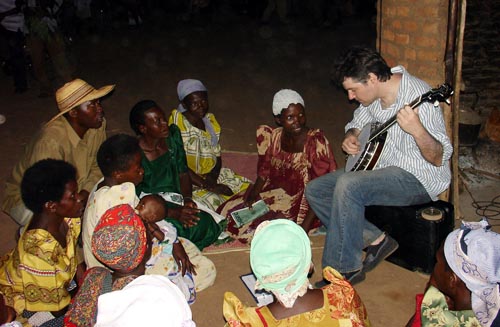Bela Fleck takes his banjo back to Africa

Bela Fleck, The Associated Press
March 10, 2009
If you listen closely to Bela Fleck’s new CD, you can hear the chickens clucking in the background while he plays along with a group of Nakisenyi women in an African cook hut.
Fleck may have one of the more unique albums in the world genre with “Throw Down Your Heart: Africa Sessions.” The Grammy-winning banjo maestro journeyed to Uganda, Tanzania, Gambia and Mali to visit unique locations and to play with exotic instruments like the three-string akonting, widely seen as the banjo’s predecessor.
But he got more than a CD out of his journeys: Fleck also has an accompanying film, “Throw Down Your Heart,” which is set for limited release in April after playing at some festivals last year. Fleck is more than the subject of the film: He also became its producer and editor.
“I’ve never edited film before, but I realized pretty quickly nobody was going to get the music parts right unless I did it,” Fleck said. “I couldn’t afford to pay somebody what it would cost to get it right. It was a big job, but I took it on.”
The title comes from stories told about Africans who “threw down their hearts” when they realized they would never see their homeland again when taken to be slaves. The Africa trip came at a time when Fleck’s regular touring band, the Flecktones, took a hiatus after 16 straight years together on the road. Fleck said he was struggling with his role as leader of the band and had some revelations about how to handle it after meeting with musician Haruna Walisimbi in Uganda.
Get The Daily Illini in your inbox!
“Its hard to put it into words,” Fleck said in a phone interview from Nashville where he lives. “There was a grace with the way he did it and a comfort with being a leader. I’ve never been completely comfortable with being a leader.”
Despite that discomfort, Fleck was once again put into a leadership role after he was unable to get record industry backing for his film.
“The budget shocked them, and they suddenly dropped out,” Fleck said.
Unwilling to give up, Fleck dipped into his own bank account, spending what he estimates is $400,000. He worked as the CD and film’s producer. He, along with his brother Sascha Paladino, who directed the film, spent two years editing 250 hours of footage.
Adjusting the banjo to the African music came naturally, Fleck said.
“I thought it would because I’ve done a lot of playing with musicians from different countries,” he said. “In most cases, it works out very well, and I don’t know why. For me, it’s always come very easily.”
Fleck will be touring starting this spring off and on into 2010 with an ever-changing group of African musicians who appeared in the film and on the CD.
He hopes the project leads to similar ventures in other countries, such as India, China and Mongolia.
“I feel very good that this is where I want to be,” he said. “I was 47 when I went to Africa, and I was thinking I need to start doing things like this because I’m not going to be doing it in my 70s. Time is flying.”






